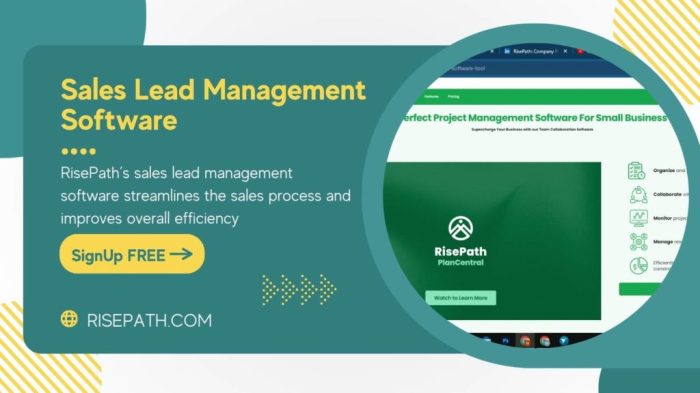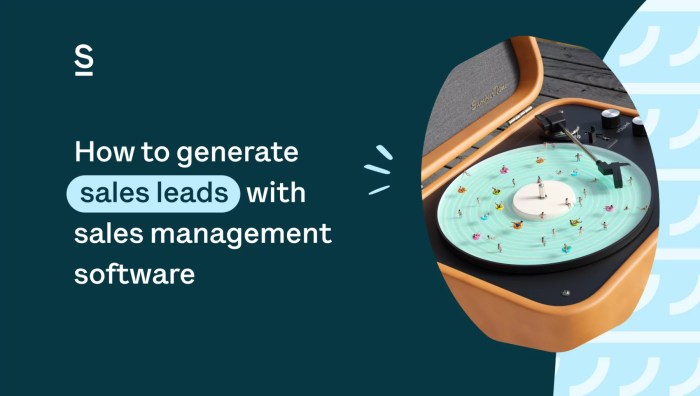Sales leads management software revolutionizes how businesses nurture potential customers. It streamlines the entire sales process, from initial contact to final conversion, providing valuable insights into lead behavior and performance. Effective lead management software empowers sales teams to prioritize high-potential prospects, personalize communication, and ultimately boost conversion rates, significantly impacting overall revenue generation. This allows for efficient resource allocation and improved sales forecasting, fostering a more data-driven approach to sales.
By centralizing lead information, automating tasks, and providing insightful analytics, these platforms enable sales teams to focus on building relationships and closing deals. Features like lead scoring, automated email sequences, and reporting dashboards contribute to a more efficient and effective sales cycle. The right software can adapt to various business sizes and sales strategies, offering customizable solutions to meet unique needs.
In today’s competitive business landscape, efficiently managing sales leads is paramount to achieving sustainable growth. The sheer volume of leads generated through various marketing channels can quickly become overwhelming without a robust system in place. This is where sales leads management software steps in, offering a centralized platform to capture, nurture, and convert leads into paying customers. This detailed guide explores the intricacies of sales leads management software, covering its key features, benefits, selection criteria, and frequently asked questions.
Understanding Sales Leads Management Software: A Deep Dive
Sales leads management software, also known as lead management software or sales CRM (Customer Relationship Management) software, is a technology solution designed to automate and optimize the entire sales lead lifecycle. From initial contact to final conversion, this software streamlines the process, improving sales team productivity and overall sales performance. It acts as a central hub, consolidating data from multiple sources and providing a unified view of each lead’s journey.
Key Features of Effective Sales Leads Management Software:
- Lead Capture and Tracking: The software integrates with various marketing platforms (email marketing, social media, website forms) to automatically capture leads and track their interactions.
- Lead Scoring and Qualification: Algorithms analyze lead data (demographics, behavior, engagement) to assign scores, prioritizing high-potential leads for immediate follow-up.
- Lead Distribution and Assignment: Leads are automatically routed to the appropriate sales representatives based on predefined criteria (territory, product expertise, etc.).
- Communication Management: The software facilitates seamless communication through email, phone, and chat, maintaining a comprehensive history of interactions.
- Workflow Automation: Automates repetitive tasks such as email sequences, reminders, and follow-ups, freeing up sales reps to focus on higher-value activities.
- Reporting and Analytics: Provides detailed reports and dashboards to track key metrics (conversion rates, sales cycle length, lead source performance), enabling data-driven decision-making.
- Integration Capabilities: Seamless integration with other business applications (CRM, marketing automation, email marketing platforms) for a unified data ecosystem.
- Sales Forecasting and Pipeline Management: Provides insights into future sales performance by analyzing the sales pipeline and predicting revenue.
Benefits of Implementing Sales Leads Management Software
The advantages of utilizing sales leads management software extend beyond mere organization. It significantly impacts various aspects of the sales process, leading to substantial improvements in efficiency and profitability.
Improved Sales Productivity and Efficiency:
By automating repetitive tasks and streamlining workflows, sales representatives can focus their energy on building relationships and closing deals, resulting in increased productivity and higher conversion rates. This leads to a significant return on investment (ROI).
Enhanced Lead Nurturing and Conversion Rates:
The software enables targeted lead nurturing strategies, delivering personalized content and timely follow-ups to keep leads engaged throughout the sales cycle. This increases the likelihood of conversion and reduces the overall sales cycle length.
Better Sales Team Collaboration and Communication:, Sales leads management software
A centralized platform facilitates seamless collaboration among sales team members, ensuring everyone has access to the same information and reducing the risk of duplicated efforts or missed opportunities.

Source: risepath.com
Data-Driven Decision Making:
The software provides valuable insights into lead behavior, sales performance, and other key metrics, enabling data-driven decision-making to optimize sales strategies and improve overall results. This includes identifying top-performing lead sources and refining marketing campaigns.
Increased Revenue and Profitability:
By improving sales efficiency, conversion rates, and overall sales performance, sales leads management software ultimately contributes to increased revenue and profitability for the business.
Choosing the Right Sales Leads Management Software: Key Considerations
Selecting the appropriate sales leads management software requires careful consideration of various factors. It’s crucial to choose a solution that aligns with your specific business needs and budget.
Factors to Consider When Selecting Software:
- Scalability: Ensure the software can accommodate your future growth and expanding lead volume.
- Integration Capabilities: Check for compatibility with your existing CRM, marketing automation, and other business applications.
- User-Friendliness: Opt for a software with an intuitive interface that is easy for your sales team to learn and use.
- Features and Functionality: Prioritize features that directly address your specific needs and challenges.
- Pricing and Support: Evaluate the cost of the software, including any additional fees for implementation, training, or support.
- Security and Data Privacy: Ensure the software complies with relevant data protection regulations and offers robust security measures.
Frequently Asked Questions (FAQs)
- Q: What is the difference between sales leads management software and CRM software?
A: While often used interchangeably, CRM software is a broader term encompassing customer relationship management across all aspects of the business. Sales leads management software is a specialized subset of CRM, focusing specifically on the sales lead lifecycle. - Q: How much does sales leads management software cost?
A: Pricing varies greatly depending on the features, scalability, and vendor. Options range from affordable cloud-based solutions to enterprise-level systems with higher price tags. - Q: How long does it take to implement sales leads management software?
A: Implementation time depends on the complexity of the software and your business processes. It can range from a few weeks to several months. - Q: What are the key metrics to track with sales leads management software?
A: Key metrics include lead conversion rates, sales cycle length, lead source performance, average deal size, and customer lifetime value. - Q: Can sales leads management software integrate with my existing marketing automation platform?
A: Most reputable sales leads management software offers integration capabilities with various marketing automation platforms. Check for compatibility before purchasing.
Conclusion: Embrace the Power of Automation
Implementing sales leads management software is a strategic investment that can significantly enhance your sales process, improve team productivity, and drive revenue growth. By leveraging the power of automation and data-driven insights, businesses can effectively manage their sales leads, nurture prospects, and ultimately convert more leads into loyal customers. Choosing the right software and utilizing its features effectively is key to unlocking its full potential.
References: Sales Leads Management Software
While specific software recommendations are avoided to maintain objectivity, reputable sources for further research include:
- Gartner (for industry reports and analyses)
- Forrester (for research and advisory services)
- Capterra (for software reviews and comparisons)
Call to Action
Ready to transform your sales process and achieve unprecedented growth? Explore the leading sales leads management software options available today and request a demo to see how it can benefit your business. Don’t let valuable leads slip through the cracks – take control of your sales pipeline and maximize your revenue potential!
In conclusion, implementing sales leads management software offers a powerful advantage in today’s competitive market. By optimizing lead nurturing, automating processes, and providing data-driven insights, businesses can significantly improve their sales performance. The return on investment from increased efficiency, improved conversion rates, and better sales forecasting makes it a strategic asset for growth. Choosing the right software, tailored to specific business needs, is crucial for maximizing its benefits and achieving sustainable sales success.
Key Questions Answered
What are the key features of good sales leads management software?
Key features typically include lead capture and tracking, lead scoring and prioritization, automated workflows (email marketing, etc.), reporting and analytics dashboards, integration with CRM systems, and contact management tools.

Source: dtreviewstq.com
How much does sales leads management software cost?
Pricing varies widely depending on features, scalability, and vendor. Options range from affordable monthly subscriptions for small businesses to enterprise-level solutions with higher costs.
How do I choose the right sales leads management software for my business?

Source: surfe.com
Consider your business size, sales process, budget, and required features. Research different platforms, read reviews, and potentially try free trials before committing to a purchase.
Can sales leads management software integrate with my existing CRM?
Many platforms offer seamless integration with popular CRM systems like Salesforce, HubSpot, and Zoho. Check for compatibility before purchasing.